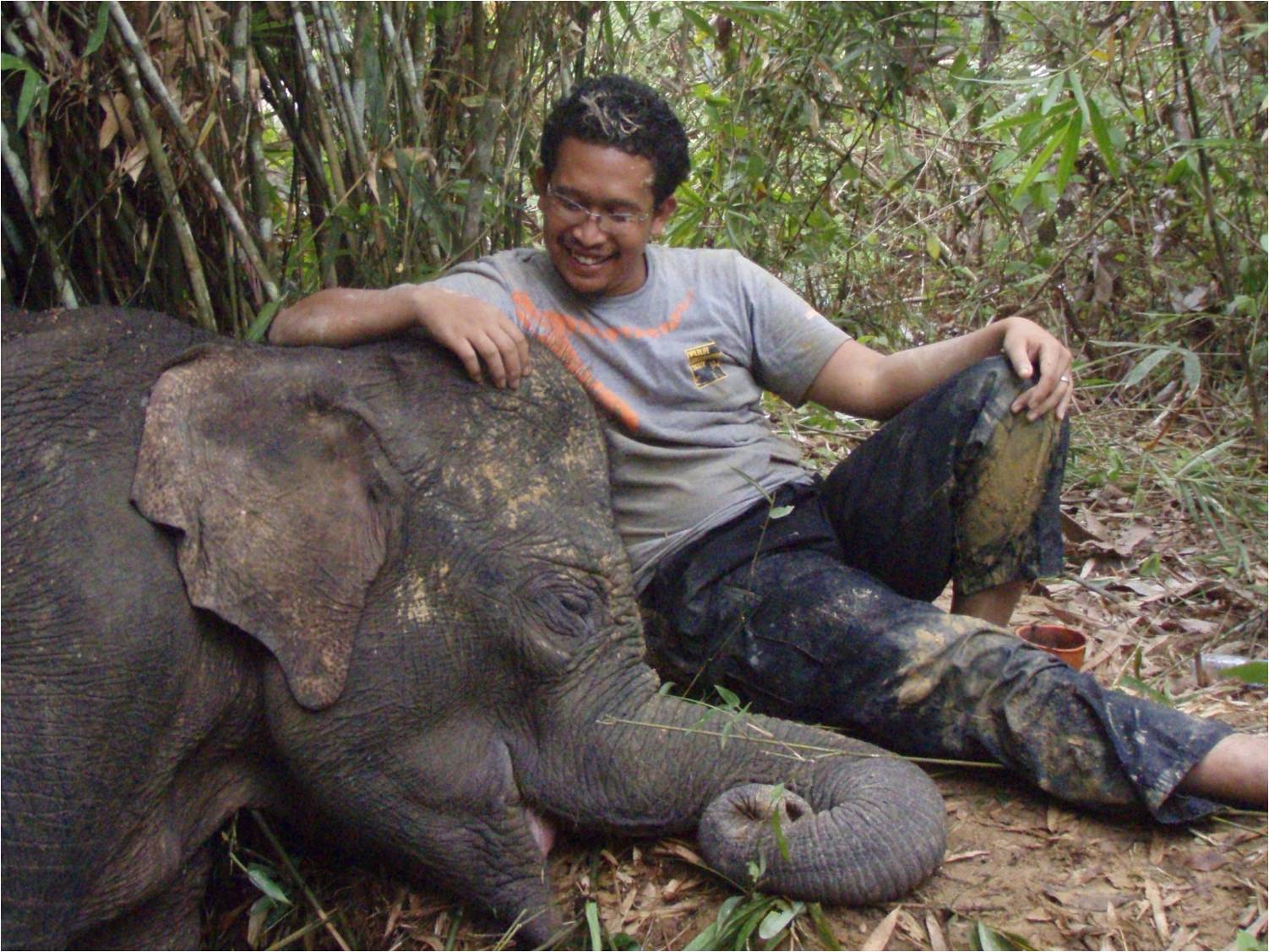Kholis
Kholis is the new person in charge of Flora and Fauna International (FFI, see project description), he coordinates their key species’ programs (elephants are a main part of this program). When I was introduced to FFI’s office I immediately liked his way of thinking. His views of the protection of the environment is a good balance between the development of local communities and the conservation of nature. He always measures his words and I think he is a good project manager with a great sense of team spirit.
When I asked Kholis about his feelings of the Sumatran elephant, he didn’t speak about his love and admiration for the animal as most of the previous people in these portraits have. Instead he described the species as a victim that must be protected. Many elephants are found poisoned, killed for their tusks or injured by traps. He vividly remembers the first elephant he rescued in 2009. It was a young elephant caught in a trap that was very injured, but able to be rescued (the picture was taken during another rescue intervention were the elephant was also saved). It is a conflict, he says, very well spread, Kholis receives multiple testimonies everyday. Elephants are “territorial animals that follow specific paths and its when this path crosses men’s roads that conflicts arise. We must change the crops produce at the edge of the forests to crops that repel elephants. Otherwise, they will remain the victims when they get too close to the villages.”
Kholis, as many people working in environmental protection in Indonesia, focused on veternary studies. He started working in a rescue center for wildlife, which treated animals that were coming from illegal trade that were released into the wild. Many of the animals could not be rehabiliated into the wild and Kholis decided that the best place to protect animals would be to work directly on the threats to Indonesian wildlife, “before they are killed.” He then left his veterinary work, not without regret, and began working on tiger conflicts.
It is very common that provinces facing conflicts with tigers are also facing conflicts with elephants. These are mainly the villages situated at the edge of the rainforest. This lead Kholis to begin working with elephants, he, “couldn’t ignore the elephant conflicts and limit our work to the tiger. I received instructions on how to proceed by other elephant specialists and I began to intervene on human-elephant conflicts, the most important thing is to be present.” According to Kholis, he was able to be effective during a conflict because during their interventions he was able to show the local people that he cared about their problems, he didn’t come just to take pictures of the damage and leave immediately. He remained a decent amount of time to help and stayed to “feel what they felt.” Unfortunately, the local people often expect compensation for their losses, but for Kholis, the corruption rate is too high in Indonesia in order to implement an effective compensation system. Conflicts with wildlife can become, “an open door for poaching, if nobody is there, poachers come and settle the conflict in their own way by killing the animal.” According to Kholis, rapid field response by the CRU (Conservation Response Unit, see project description) is the best way to save the animal.
The situation is the same with the tiger. Local populations will set up traps or put poison near their village, “and they have their reasons, for example, when tigers are around, it is too dangerous to return to work in the field.” Kholis says that there is no effective legislation to protect wildlife and the perpetrators of killing a protected species are not convicted. Consequently, the best way to protect and manage the conflict is to prevent them from being killed.
Kholis recently joined the team of FFI, his new position requires more work with the local populations. Most of the work at FFI is involved in community development and is involvemed in the selection of community rangers from local populations to protect nature. In regards to wildlife, Kholis regrets that their response to a conflict is sometimes slow because they have to consult local people before they can begin their intervention. According to him, it is necessary, “to see the whole picture before we no longer have wild tigers or wild elephants and each community ranger should be trained and able to intervene when a conflict arises.” He recognizes the quality of the CRU, which has sensible community rangers that know about the human-elephant conflict. Kholis has pushed them to respond more quickly. However, according to him, the CRU must not only be linked to conflicts with elephants. They should have a greater impact and raise local awareness on the importance of protecting their forests. They are, “a tool that shows that local people can find livelihoods without destroying the forest.” He hopes that in the future the CRU might expand their program and will, for example, start growing crops around the camp that repel elephants, it would provide a source of new revenue for the local community.

